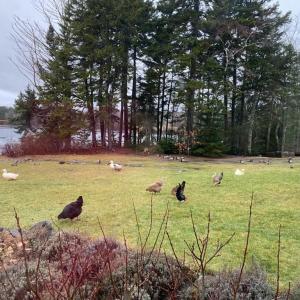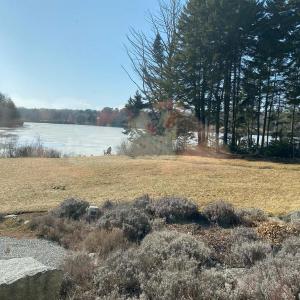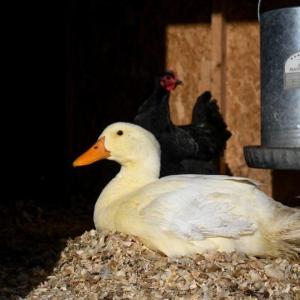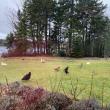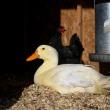Maine euthanizes another flock of domesticated birds in Cushing threatened by Avian flu
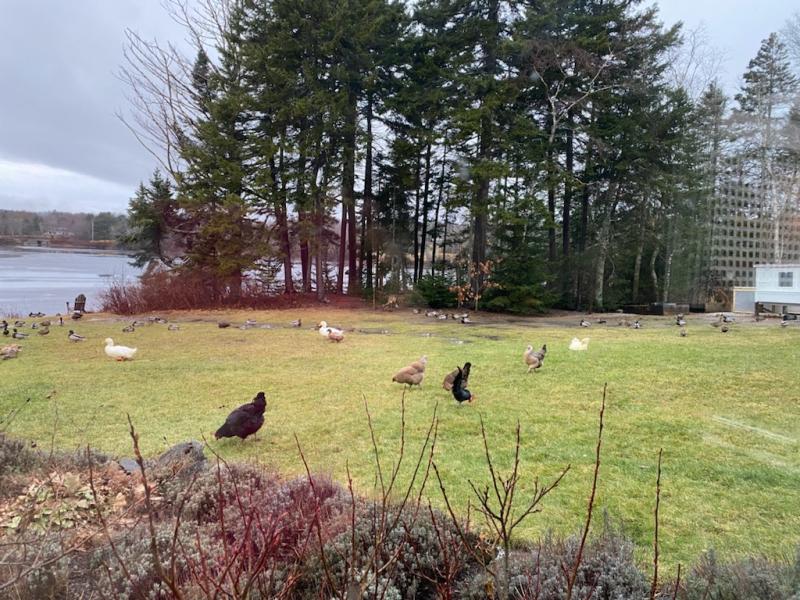 This the yard of Charly Haversat, where her domesticated chickens and ducks, some of whom she had – and considered as pets – were more than 7 years old. They have all been euthanized due to the possible spread of Avian flu through the domesticated flock. That threat arrived on wild ducks and geese that also landed at her salt pond, on the Atlantic flyway. (Photo by Kelsey Matheson)
This the yard of Charly Haversat, where her domesticated chickens and ducks, some of whom she had – and considered as pets – were more than 7 years old. They have all been euthanized due to the possible spread of Avian flu through the domesticated flock. That threat arrived on wild ducks and geese that also landed at her salt pond, on the Atlantic flyway. (Photo by Kelsey Matheson)
 The yard and salt pond at Haversat’s Cushing home is now empty of all birds. (Photo by Kelsey Matheson)
The yard and salt pond at Haversat’s Cushing home is now empty of all birds. (Photo by Kelsey Matheson)
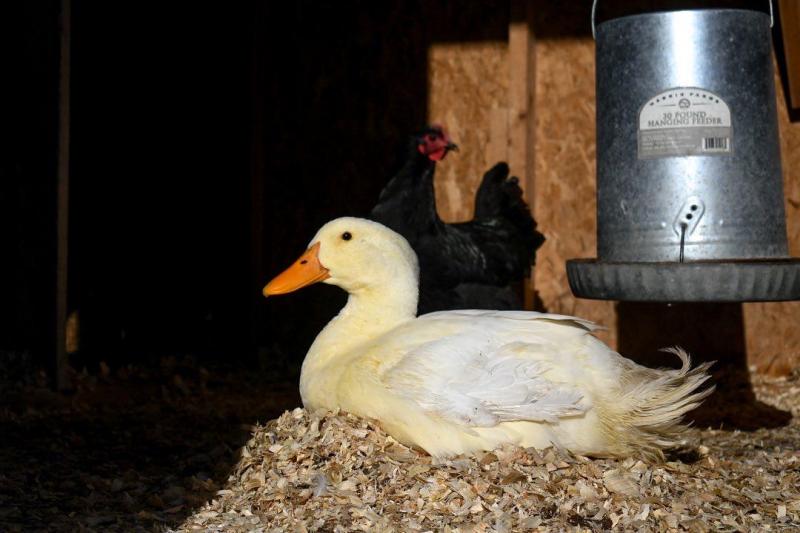 “Our favorite duck,” said Charly Haversat. The duck is now deceased. (Photo by Kelsey Matheson)
“Our favorite duck,” said Charly Haversat. The duck is now deceased. (Photo by Kelsey Matheson)
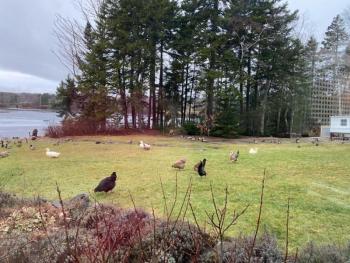 This the yard of Charly Haversat, where her domesticated chickens and ducks, some of whom she had – and considered as pets – were more than 7 years old. They have all been euthanized due to the possible spread of Avian flu through the domesticated flock. That threat arrived on wild ducks and geese that also landed at her salt pond, on the Atlantic flyway. (Photo by Kelsey Matheson)
This the yard of Charly Haversat, where her domesticated chickens and ducks, some of whom she had – and considered as pets – were more than 7 years old. They have all been euthanized due to the possible spread of Avian flu through the domesticated flock. That threat arrived on wild ducks and geese that also landed at her salt pond, on the Atlantic flyway. (Photo by Kelsey Matheson)
 The yard and salt pond at Haversat’s Cushing home is now empty of all birds. (Photo by Kelsey Matheson)
The yard and salt pond at Haversat’s Cushing home is now empty of all birds. (Photo by Kelsey Matheson)
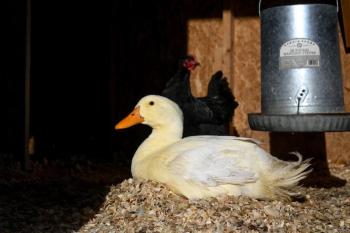 “Our favorite duck,” said Charly Haversat. The duck is now deceased. (Photo by Kelsey Matheson)
“Our favorite duck,” said Charly Haversat. The duck is now deceased. (Photo by Kelsey Matheson)
Duck, geese and chicken owners along the Cushing peninsula are distressed these days as the Maine Dept. of Agriculture arrives to euthanize flocks infected with the Avian flu virus, and its highly pathogenic strain H5N1. And bird owners throughout the Midcoast are worried that the virus, carried primarily via wild ducks, has already infected their own backyard birds.
To date, two flocks, separated by almost three miles, have been euthanized. Migratory ducks are considered the vector, as they carry the virus but do not fall ill with the disease.
On Feb. 23, employees with the state’s veterinarian’s office arrived in Cushing to euthanize the second flock, three days after euthanizing 27 ducks and chicken at a nearby home, Feb. 19.
The owner of the latter flock, Charly Haversat, is grieving for her birds, some which she has owned for seven years. But, she is also determined to build community awareness about the presence of pathogens that emerge with climate change. The virus will not be going away, said Haversat, and humans must learn to cope.
“It is like having 27 pets die in one day,” she said.
Maine’s Dept. of Agriculture, Conservation and Forestry, and its veterinarian division, had arrived Sunday to cull her birds. The method involves gassing, and their carcasses are composted at an approved state site.
“Michelle [Walsh, state veterinarian with the Maine Dept. of Agriculture, Conservation and Forestry] and her team were amazing,” she said. “The were professional and compassionate.”
On Feb. 23, a similar scenario occurred just a few miles from Haversat’s Cushing home, where a larger backyard flock of non-poultry birds were euthanized, according to the Maine Dept. of Agriculture, Conservation and Forestry.
Until this year, it has been a rarity for the virus to even surface in the northeastern U.S., but it was detected first this year in January, along the Atlantic flyway in North Carolina, subsequently confirmed in 53 hunter-harvested wild waterfowl at three sites.
The U.S. Dept. of Agriculture is keeping a running tab on where the virus has emerged. Yesterday, it was detected in a commercial chicken farm in Delaware; the day before, in Maine; prior to that, in New Hampshire, New York and Virginia. It then reports its findings to the World Organization for Animal Health and international trading partners.
The last time an outbreak of Avian flu occurred was in 2015, and while the U.S. Dept. of Agriculture said that it is not uncommon for the virus to exist in migratory birds, it is the backyard and commercial chicken populations that are vulnerable to the pathogen, which infects the lungs and manifests as a respiratory disease.
At first, there was a hope that the virus would be traced to a lower level pathogen, and she would be able to quarantine her ducks, not euthanize them. But that was not the case, as the highly pathogenic strain appeared in the test.
“Through our ongoing wild bird surveillance program, APHIS [Animal and Plant Health Inspection Service] collects and tests large numbers of samples from wild birds in the North American flyways,” said the USDA, in a Feb. 16 announcement of the virus. “It is not uncommon to detect avian influenza in wild birds, as avian influenza viruses circulate freely in those populations without the birds appearing sick. In addition to monitoring for avian influenza in wild bird populations, APHIS monitors for the virus in commercial and backyard birds.”
Haversat said her salt pond has been a resting spot for migrating geese and ducks. Last week, two of her chickens had died. At first, she thought it had to do with natural causes – both had been rescues, and she did not know their history.
But on Saturday, she went into the chicken coop and discovered a third chicken that was lethargic and puffed up, “like a basketball,” said Haversat.
When that chicken died, Haversat called her vet, and the process of testing for avian flu got underway with the state’s veterinarian office.
The bird tested positive for the Eurasian H5 strain of highly pathogenic avian influenza. This strain triggers a universal concern for heightened biosecurity practices, which urge solating birds from people in an enclosed environment and keeping flocks away from ponds where they might encounter migrating birds.
Bird owners are to: “stay vigilant to protect poultry and pet birds from this disease. APHIS is working closely with state partners on surveillance, reporting, and control efforts.”
Ducks, which are not made ill by the virus, are considered the Trojan horses to the health of domesticated poultry, with the disease carried silently in on their wings.
According to the National Institute of Health: “Wild ducks are the main reservoir of influenza A viruses that can be transmitted to domestic poultry and mammals, including humans. Of the 16 hemagglutinin (HA) subtypes of influenza A viruses, only the H5 and H7 subtypes cause highly pathogenic (HP) influenza in the natural hosts. Several duck species are naturally resistant to HP Asian H5N1 influenza viruses. These duck species can shed and spread virus from both the respiratory and intestinal tracts while showing few or no disease signs. While the HP Asian H5N1 viruses are 100% lethal for chickens and other gallinaceous poultry, the absence of disease signs in some duck species has led to the concept that ducks are the ‘Trojan horses’ of H5N1 in their surreptitious spread of virus.”
Maine’s Dept. of Agriculture said Feb. 23 that avian flu presents no food safety risks, and that, “poultry and eggs are safe to eat when handled and cooked properly.”
No cases of this particular strain have been detected in humans in the U.S. and presents a low risk to the public.
However, it is the health of the commercial chicken industry, as well as the local egg and poultry enterprises, that is at risk. Maine continues to monitor and test for the pathogen in domesticated birds.
“Backyard and commercial operators are advised to keep birds indoors to prevent the spread of HPAI,” the department said.
Additionally, the USDA advises that all bird owners, whether commercial producers or backyard enthusiasts, should:
Practice protective security measures to help prevent disease
Prevent contact between their birds and wild birds, and
Report sick birds or unusual bird deaths to State/Federal officials, either through your state veterinarian or through USDA's toll-free number at 1-866-536-7593.
To Haversat, the emergence of avian flu arrives when the Midcoast is exhausted by pandemics and pathogens. Many homeowners have invested in bird flocks to help eradicate ticks, which carry tick borne bacteria dangerous to humans.
Now the Avian flu marches in.
“This is a disease that can wipe out the livelihood of some of our neighbors,” she said.
But it also is symptomatic of a changing climate. The virus is said to thrive in cold air, and even more so in rapid fluctuations of cold to warm temperatures and vice versa.
“Climate change is a thing,” said Haversat. “The planet is going to go on but humans aren’t going to make out. This isn’t something that happens to other parts of the country. This is happening here in our neighborhood and is never going to go away.”
She is grieving for her birds, and recognizes they were the harbinger of the virus’ emergence in Maine.
“My husband and I will take to our grave that we had the first birds with avian flu in the state,” she said.
But with a catch in voice, she is honoring her birds.
“I’m proud that my ducks were able to provide training for the state.”
It is highly unlikely that she will ever keep birds, again, even though she loved watching them from her office, overlooking the yard and pond.
“I loved my birds,” she said. “I found them comforting. Over the span of three years we went from six to 30, and just gave the eggs away.”
A week ago, her yard was a happy spot for wild and domesticated birds. Today it is empty. A virus landed in her salt pond and destroyed normalcy. Now it is up to other bird owners in the Midcoast to be vigilant, and knock the virus back.
Reach Editorial Director Lynda Clancy at lyndaclancy@penbaypilot.com; 207-706-6657

